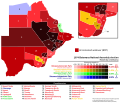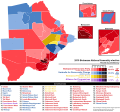 |
|---|
| Constitution |
Botswana is a parliamentary republic with an executive presidency operating under a multi-party system. [1] [2] [3] The first president to govern Botswana was Sir Seretse Khama. [4] The country has had 13 formal general elections since 1961, with one happening every five years. [5] [6] The recent election was held on 30 October 2024. [7] Each president is limited to two five-year terms; Quett Masire, the second president, created Botswana’s term limit in 1997. [8] [9] [10] [11] The country first adopted universal franchise during the 1965 Bechuanaland general election. [12]

Every election from independence until 2024 was won by the Botswana Democratic Party. [15] [16] The President of Botswana is selected after the general election. For this process, the presidential candidate from the political party that wins a majority of the seats is sworn-in as president. [17]












